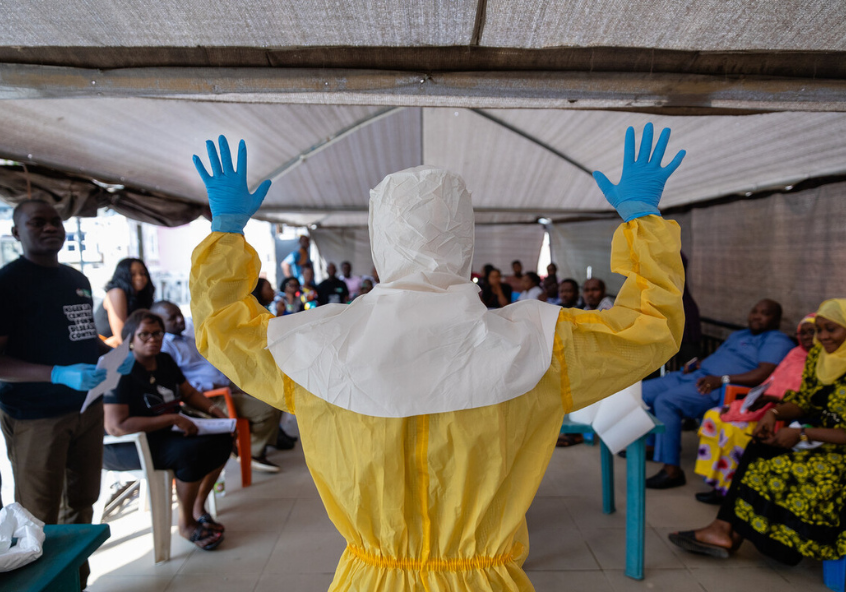Ebola 10 years on: why trust remains key
London School of Hygiene & Tropical Medicine https://lshtm.ac.uk/themes/custom/lshtm/images/lshtm-logo-black.png Friday 22 March 2024
The 2014 Ebola outbreak spread across West Africa. Pictured: Dr Abdulmajid Suleiman Musa shows how a correctly prepared PPE suit should look, Keffi, Nasarawa state in Nigeria. Credit: Louis Leeson/LSHTM
23 March 2024 marks 10 years since the World Health Organization reported an outbreak of Ebola Virus Disease in Guinea. This was the beginning of what remains the largest Ebola epidemic to date, as in the following months the disease spread rapidly across West Africa.
Sierra Leone, Liberia, and Guinea were worst affected, registering a cumulative 28,616 cases and 11,310 deaths. The declaration of a public health emergency of international concern, coupled with national state of emergency legislation in these countries, also had long-lasting social and economic repercussions.
The experience of Ebola has had a profound impact on vaccine development, as well as global and national public health systems, particularly in response to new epidemics. This includes new global mechanisms for assessing epidemic preparedness, funding response, and supporting knowledge sharing and research. In affected countries like Sierra Leone, a newly established National Public Health Agency builds on the significant expertise that now exists in the country for infectious disease surveillance, laboratory testing, infection prevention and control, clinical research, and risk communication.
LSHTM academics played a key role in the 2014 Ebola outbreak response, from infectious disease modelling to establishing the Ebola Anthropology Platform to provide rapid social science expertise to support outbreak response. LSHTM also led clinical trials of the Jansen Ebola vaccine (EBOVAC) in Kambia District, Northern Sierra Leone, with the College of Medicine and Allied Health Sciences of the University of Sierra Leone. While a vaccine had been in development since soon after the discovery of Ebola in the Democratic Republic of Congo (DRC) in 1976, none had been licensed by the time of the West African outbreak.
The EBOVAC trial opened its doors in October 2015. We worked as anthropologists on the trial, and, with a team of local social scientists, we conducted research on local experiences and perspectives of the vaccines. We established a system for feeding social science data into community engagement to address anxieties and mistrust of the vaccine in real time. Our work highlighted the understandable reasons why people were suspicious of the arrival of a large international clinical research project in the middle of a health crisis. We showed, for example, how fears that the trial staff might have come to steal blood from the population revealed broader mistrust in international actors that had deep historical roots in colonial and post-colonial violence. At the same time, we also chronicled people’s narratives of sacrifice and altruism when deciding to join the trial and take the vaccine.
The two-dose vaccine candidate tested in the EBOVAC trial was found to be well tolerated and immunogenic, leading to approval by the European Commission. During the West African Ebola outbreak, the ERVEBO vaccine produced by Merck was also trialled and found to be protective, achieving European and FDA approval. The arrival of vaccines was a game changer, and it meant that during subsequent epidemics, such as those between 2018-2020 in DRC and 2021 in Guinea, responders had better tools to contain the epidemic. The Janssen Ebola vaccine is now used to protect health workers in potentially epidemic areas and the ERVEBO vaccine has been used in ring vaccinations – a method co-developed by LSHTM which involves vaccinating people in rings of contacts and contacts of contacts of confirmed cases - to stop active transmission.
Nonetheless, as the protracted Ebola epidemic in DRC and epidemics of a different Ebola strain in Uganda in 2022-2023 have shown, having effective vaccines is not enough. In the immediate aftermath of the West African epidemic, expert panels reflected on lessons to prevent future outbreaks. A key insight that shapes future response is recognising the need to build the trust of communities affected by health emergencies. The work done by social scientists and community activists during the Ebola outbreak highlighted the importance of two-way dialogue and the development of response measures that take into account people’s experiences and perspectives. For example, such dialogue led to the integration of local funerary practices in the ways safe and dignified burials were conducted. Community engagement is now an established component of any international response. Recent efforts to develop “integrated outbreak analytics” similarly reflect a recognised need for multidisciplinary approaches to outbreak response, including social science data and local perspectives in how we understand and respond to health emergencies.
Despite the reforms and scientific advancements achieved after Ebola, the world faced significant challenges when confronted with the COVID-19 pandemic. This included difficulties in securing citizens’ trust and building confidence in novel vaccines. We did however observe that communities that had been affected by Ebola were able to build on their experience and react more effectively to the pandemic. Whatever the disease or exact nature of the next epidemic or pandemic, trust and engagement with communities must be part of the solution at every stage.
If you enjoyed this article and would like to build a career in global health, we offer a range of MSc programmes covering health and data, infectious and tropical diseases, population health, and public health and policy.
Available on campus or online, including flexible study that works around your work and home life, be part of a global community at the UK's no.1 public health university.

